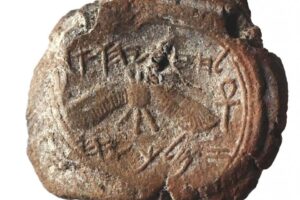Jeconiah’s Curse, Amazing Promise & Impossible Challenge
Jeconiah’s so-called curse is cited in agnostic and atheist theories as evidence against the legitimacy of Jesus of Nazareth as the Messiah. Ironically, the evidence is based on Biblical prophecies foretelling the Messiah must be born in the royal House of David which is then used to claim the prophecy cannot be fulfilled because of Jeconiah’s curse.[1]
Adversaries can sometimes make for strange bedfellows. Judaism has no choice but to side with Christianity on this allegation because, if true, prophecies foretelling the Messiah would come from the House of David – Jesus nor anyone else whom Judaism teaches is the Messiah – can never be.
Setting the scene, Jehoiakim, king of Judah, drew the wrath of God for his evil ways as well as his son, Jeconiah (aka Coniah or Jehoiachin), for following in his footsteps.[2] God sent the prophet Jeremiah with a message of judgment to the kingdom – death for Jehoaikim (aka Josiah), but for Jeconiah…
Jer. 22:30 This is what the LORD says: “Record this man as if childless, a man who will not prosper in his lifetime, for none of his offspring will prosper, none will sit on the throne of David or rule any more in Judah.”(NIV)
Jeconiah was condemned by God to be a man as if he had no sons, nor would of his offspring ever sit on the Throne of David. He was the last of the sitting kings in the royal succession of David.
Serving as King for all of 3 months, he was taken captive by King Nebuchadnezzar of Babylon. He spent his days in a Babylonian prison for 37 years.[3]
Eventually, Jeconiah fathered sons during his Babylonian captivity, the first son being Salathiel.[4] His name bears witness to Jeconiah’s fate, according to the Talmud, where he was called by a name meaning to be conceived in prison while standing up.[5] His sons grew up without him…as if he had no sons.[6]
Just five verses after God’s judgement of Jeconiah, Jeremiah issued another prophecy making clear David’s royal lineage had not ended. God explicitly promised another King would arise from the Branch of David:
Jer 23:5 “Behold, the days are coming,” declares the LORD, “When I will raise up for David a righteous Branch; And He will reign as king and act wisely And do justice and righteousness in the land.”(NASB)
After Jerusalem had been crushed by Babylon, Nebuchadnezzar appointed Zedekiah, Jeconiah’s brother, as his puppet king of Israel. Zedekiah had learned nothing from the judgments of his father and brother spending the next decade ignoring and offending both God and Nebuchadnezzar.[7]
Zedekiah rescued the prophet Jeremiah from an empty cistern where he was thrown by his enemies. Still, the King confined Jeremiah in an outdoor prison courtyard for prophesying doom at the hands of Nebuchadnezzar.[8]
Nevertheless, that did not stop Jeremiah from issuing another Branch prophecy demonstrating that God’s judgement of Jeconiah had a limited shelf life. During his outdoor imprisonment, Jeremiah prophesied again that Israel would be restored and David would never fail to have a man sitting on his throne:
Jer. 33:17 “For this is what the LORD says: ‘David will never fail to have a man to sit on the throne of the house of Israel, …”(NIV)
Jewish Rabbis and the Talmud teach that God pardoned Jeconiah and Biblical history provides corroborating evidence.[9] Pointing to Evil-Merodach, Nebuchadnezzar’s successor, Jeconiah was released from prison and dined daily with the King of Babylon with a seat of honor.[10]
Emphasizing the trustworthiness of His incredible promise to Israel and Judah, God issued an impossible challenge based on the steadfastness of astronomy:
Jer. 33:20-21 “”Thus says the LORD, ‘If you can break My covenant for the day and My covenant for the night, so that day and night will not be at their appointed time, then My covenant may also be broken with David My servant so that he will not have a son to reign on his throne…”(NASB)
Scrolling forward two generations, Zerubbabel, “The son of Salathiel, of the posterity of David,” is called out by Jewish historian Josephus. A Hebrew leader of great prominence, Zerubbabel served as a body guard for Persian King Cyrus.[11]
Cyrus was solicited by Zerubbabel to allow the rebuilding of the Temple and return of its vessels from Nebuchadnezzar’s conquest. Astonishingly, the Temple’s gold vessels had survived both the Babylonian captivity and the Persian invasion.
Not only was his request granted by decree, Cyrus appointed Zerubbabel as the governor to lead the Hebrews out of captivity back to Jerusalem, rebuild the city, and join the High Priest in rebuilding the Temple.[12] Through the prophet Haggai, God blessed Zerubbabel for his leadership.[13]
Zerubbabel of the royal lineage of David, grandson of King Jeconiah, is mentioned 11 times in four books of the Old Testament, one of the few Hebrew figures to receive such recognition. He is also named in both genealogies of the Gospels Matthew and Luke.[14]

Interestingly, Jeconiah’s judgement and the blessing of Zerubbabel each use a signet ring metaphor. A ruler typically wore a unique gold signet ring bearing his name that was used to seal documents such as decrees – the seal was considered more authentic than a signature.[15]
Jer. 22:24 “”As surely as I live,” declares the LORD, “even if you, Jehoiachin son of Jehoiakim king of Judah, were a signet ring on my right hand, I would still pull you off.”(NIV)
Hag. 2:23 “‘On that day,’ declares the LORD Almighty, ‘I will take you, my servant Zerubbabel son of Shealtiel,’ declares the LORD, ‘and I will make you like my signet ring, for I have chosen you,’ declares the LORD Almighty.”(NIV)
Was the royal lineage David ended by “Jeconiah’s curse” disqualifying Jesus as the “Righteous Branch.”
Updated June 12 2024.
This work is licensed under a Creative Commons Attribution-NonCommercial-NoDerivatives 4.0 International License.
REFERENCES:
[1] Willruth, Bart. “The Gospel of Matthew Debunks the Messiahship of Jesus.” Debunking Christianity. 2009. <http://debunkingchristianity.blogspot.com/2009/06/gospel-of-matthew-debunks-messiahship.html> Lippard, Jim. “The Fabulous Prophecies Of The Messiah.” Atheist Community of Austin. 1993. <https://atheist-community.org/resources/online-articles/145-the-fabulous-prophecies-of-the-messiah> Irenaeus of Lyons. Against Heresies. Book III, Chapters XXI, XXII. Ante-Nicene Fathers. Volume I. Christian Classics Ethereal Library. 2005. <http://www.ccel.org/ccel/schaff/anf01.ix.iv.html>
[2] Jeremiah 22. Net.bible.org. Jeremiah 22:24 footnote #42. CR Jeremiah 24, 27-29, 52; 1 Chronicles 3; 2 Chronicles 36; Esther 2; 2 Kings 24, 25; Ezekiel 1.
[3] 2 Kings 24.
[4] I Chronicles 3.
[5] Soncino Babylonian Talmud. Ed. Isidore Epstein. 1935-1948. Sanhedrin 37b-38a. <https://israelect.com/Come-and-Hear/talmud/index.html>
[6] Jeremiah 52.
[7] Jeremiah 52; Chronicles 36.
[8] II Chronicles 36; Jeremiah 27, 29, 37. Bakon, Shimon. “Zedekiah: The Last King of Judah”, Jewish Bible Quarterly. Vol. 36, No. 2, 2008. <http://jbq.jewishbible.org/assets/Uploads/362/362_z
[9] Isaiah 9:, 11. Jehoiachin.” Jewish Encyclopedia. 2017. <http://www.jewishencyclopedia.com/articles/8543-jeconiah> “The Problem of the Curse on Jeconiah in Relation to the Genealogy of Jesus.” Jews for Jesus. 2018. <https://jewsforjesus.org/answers/the-problem-of-the-curse-on-jeconiah-in-relation-to-the-genealogy-of-jesus-issues-prophecy>edekiah.pdf>
[10] Jeremiah 52; 2 Kings 25. Rashi, Shlomo Yitzchaki. The Complete Jewish Bible with Rashi Commentary. Yirmiyahu – Jeremiah 22:24 commentary. <https://www.chabad.org/library/bible_cdo/aid/16019#showrashi=true>
[11] Haggai 1-2. Josephus, Flavius. Antiquities of the Jews. Book XI, Chapters I, III-IV. The Complete Works of Josephus. 1850. <http://books.google.com/books?id=e0dAAAAAMAAJ&printsec=frontcover&source=gbs_ge_summary_r&cad=0#v=onepage&q&f=false> “Zerubbabel.” Jewish Encyclopedia. 2011. “Zerubbabel.” Jewish Virtual Library. 2014. “Zerubbabel.” International Standard Bible Encyclopedia Online. 2018. <http://www.internationalstandardbible.com/Z/zerubbabel.html
[12] Ezra 1, 6.
[13] Haggai 2.
[14] I Chronicles 3; Nehemiah 12; Ezra 3, 5; Haggai. 1, 2; Matthew 1; Luke 3. “Zerubbabel.” Jewish Encyclopedia. “Zerubbabel.” Jewish Virtual Library. Josephus. Antiquities. Book XI, Chapter III (spelled Zorobabel).
[15] “A brief history of signet rings.” The History Press. 2018. < https://www.thehistorypress.co.uk/articles/a-brief-history-of-signet-rings > Davis, Ashley. “The History Behind … Signet Rings.” National Jeweler. 2018. < https://www.nationaljeweler.com/fashion/antique-estate-jewelry/4637-the-history-behind-signet-rings-2 > Seal of Hezekiah. UPI.com. image. 13th century BC. <https://cdnph.upi.com/sv/ph/og/i/7091449076877/2015/1/14490824662433/v1.5/Rare-mark-of-the-seal-of-biblical-era-Judean-king-found.jpg>


 Psalms 22 is retrospectively viewed by Christians as a foreshadowing or a prophecy consistent with
Psalms 22 is retrospectively viewed by Christians as a foreshadowing or a prophecy consistent with